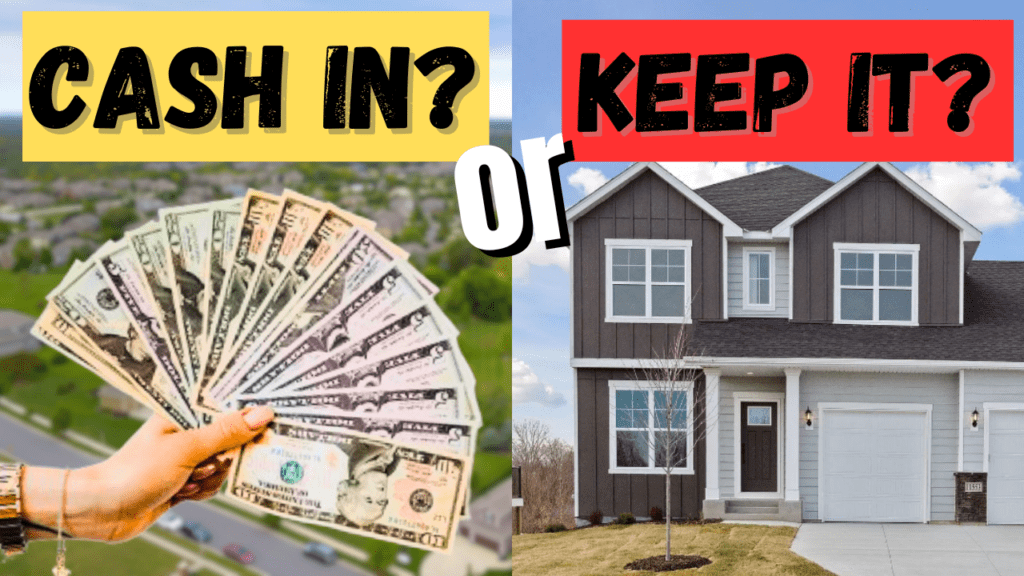Should You Sell or Rent Your Home
Current home owners have an important decision to make before buying their next home, which is deciding whether to sell their current home or keep it as a rental. Cashing out and selling is tempting because that windfall of cash can be life changing but keeping your current home as a rental property can have enormous long term financial benefits as well. So should you sell or rent your home?
Repeat Buyer Dilemma
First, let’s assume that you have a choice because some repeat buyers may need to sell their current home to qualify for the next purchase for different reasons. If you’re not sure whether you have a choice or not, you might want to talk to a mortgage loan officer and find out.
Second, we’ll assume that you’re actually willing to become a landlord and rent out your house and deal with all that entails, which I’ll talk more about in a minute.
Of course the big benefit to selling is locking in your equity gains and getting a big chunk of cash when you sell. If you lived in your home for 2 or more years, you’re not taxed on the capital gains and you can do whatever you want with your profits – like using it as a down payment on your next home, paying of debt to improve your financial situation, save for retirement or buy that toy you’ve always wanted!
Think of those capital gains if someone else pays your mortgage for another 10, 20 or 30 years! Or your house could be paid off and the rental income could be your retirement income every month.

Reasons to Keep Your Home as a Rental
I like the idea of holding on to your current home as a rental for 3 big reasons. One, you probably have a mortgage interest rate that’s under 4% and it’s safe to say that some people will never have that opportunity again so you might want to hold on to that cheap money if possible.
Two, that rental income can actually be used to cancel out your current mortgage payment from your debt ratio when you apply for another mortgage so you don’t need to make a bunch of money just to qualify for 2 mortgage payments.
Third, if you do rent out your house for more than your mortgage payment, that cash flow can offset your new 6% mortgage rate on what will probably be a more expensive new home.
Becoming a Landlord
This is a great plan if you are willing to take on the landlord responsibilities like making repairs, reporting your rental income on your taxes, and dealing with tenants – which honestly isn’t for everyone. I’ve had experience with bad tenants and a rental property that was constantly needing repairs and for me that’s not fun.
If you already know you don’t want to be a landlord, this clearly isn’t the best path for you. If you’re more comfortable selling, one of the best things could be to roll that equity into the next home. This will keep your balance and payment low, which makes it easier to qualify and live happily ever after in your dream home – with no late night calls from tenants or fixing toilets involved.
If you want to defer your cash money payday and rent your home, you’ll need to come up with your own down payment on the next home. You can use a home equity line of credit or HELOC from your current home, your own savings, a gift, or a retirement account for your next home purchase.
You can potentially still put as little as 3% down but you should be ready to put at least 5% down on your next conventional home. If you are under 80% area median income, there are still grants that you can get from community banks, like Old National Bank.
This could make your decision for you and if you don’t have the money necessary to purchase your next home, selling and using the proceeds might be the best option. If you don’t have any savings, a retirement nest egg, or a rainy day fund, you might feel better with some cash reserves in the bank and those sales proceeds might help you sleep better at night.
Paying Off Debt
If you have a lot of debt or worse, a lot of debt and no savings, take that equity while you can and get yourself in a stronger financial situation. This means paying off those high interest credit cards and personal loans. Paying off auto loans. Paying off and settling collections if you have them to get your credit scores up. This can make your monthly budget as low as possible, which of course can offset a larger new mortgage payment. You can also contribute to retirement accounts, set some funds aside to make improvements on your new home, or just keep some money in savings for unexpected life events.
Either way, lots of debt and another more expensive home is a recipe for disaster. I’ve seen people save thousands of dollars per month, just by getting rid of debt with their sale proceeds or consolidating debt through a cash-out refinance. Right now isn’t a bad time to sash out your chips considering home prices are at all time highs.
The Risk of Renting Your House Out
The biggest risk to having a rental property is your tenants. You really have to be diligent about getting the right people to rent your home, ideally someone who’s going to care for your home, and also pay rent. States like Minnesota for instance make it really hard to kick someone out of your house even if they aren’t paying rent.
At some point, you’ll need to replace big ticket items like furnaces, air conditioners, roofs, windows and the list goes on, so hopefully your handy or know someone that can help.
If you’re not in to all of that, there are property managers that can help find tenants, maintain your property, and collect rent, all for a monthly fee of course.
So there is work and risk involved with a rental property and it’s not necessarily passive income, but it’s as close to that as you can get for a lot of people and that’s what it takes to invest in real estate over time.
